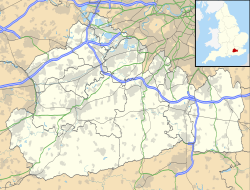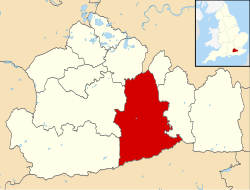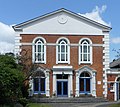| Church of Our Lady and St Peter | |
|---|---|
 The church from the southwest | |
| 51°18′00″N0°19′28″W / 51.300000°N 0.324579°W | |
| OS grid reference | TQ 16900 56985 |
| Location | Leatherhead, Surrey |
| Country | England |
| Denomination | Roman Catholic |
| Website | LeatherheadCatholics.org.uk |
| History | |
| Status | Active |
| Founded | 6 November 1915 |
| Founder(s) | Fr Bernard Kelly |
| Dedication | Blessed Virgin Mary Saint Peter |
| Architecture | |
| Functional status | Parish church |
| Architect(s) | Joseph Goldie |
| Groundbreaking | July 1922 |
| Completed | 24 June 1923 |
| Administration | |
| Province | Southwark |
| Diocese | Arundel and Brighton |
| Deanery | Epsom [1] |
| Clergy | |
| Bishop(s) | Monsignor Richard Moth |
| Priest(s) | Fr Michael Masterton OBE |
The Church of Our Lady and St Peter is a Roman Catholic church in Leatherhead, Surrey. It was founded as a local chapel during the First World War and later became a Parish church. It is situated between Copthorne Road and Garlands Road on the junction with St John's Avenue in Leatherhead. It is the only Catholic church in Leatherhead and is served by the Diocese of Arundel and Brighton.








